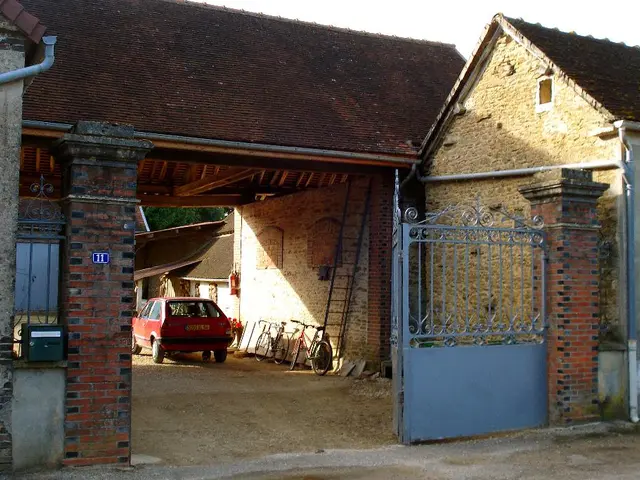The Remarkable Journey of Ursula Dees: 3,333 Spins on "Karacho" - "Karacho-Ursel" Unstoppable
Thrill-seeker experiences an exhilarating ride on the 'Karacho-Ursel' roller coaster. - Uninterrupted Rides on the Ropeway - "Karacho-Ursel" Remains Operational
Here's a wild tale that'll make your heart race! Retiree Ursula Dees, a sprightly 85-year-old, has embarked on a thrilling roller coaster adventure, clocking an astonishing 3,333 rides on the looping beast, "Karacho." "It's like living in a never-ending dream," Ursula gushed after her ride at the "Erlebnispark Tripsdrill" in Cleebronn near Heilbronn. Known as "Karacho-Ursel" in the amusement park, she's become quite the attraction!
Visitors flock to catch her autograph and even snap selfies with the roller coaster queen herself. The park, in turn, has treated her like royalty, inviting her to dinner on her birthday and special events. To show their appreciation, they even presented her with a lifetime entry ticket for her "lucky number" ride.
Can roller coasters alleviate back pain?
Ursula first took the plunge on "Karacho" 12 years ago, seeking medical advice from her doctor on the risks and side effects. The ride reportedly reaches speeds of 100 kilometers per hour in 1.6 seconds and sends passengers flying through loops. The retiree now claims that the consistent roller coaster rides help manage her back pain. She attributes the relief to the stretching effect the loops have on her body as she lets herself fall into the harness. "It's pure magic for me," she declared.
However, Dr. Ulrich Liener, the medical director of orthopedics at Stuttgart's Marienhospital, advises caution when it comes to roller coasters and back pain, particularly for individuals with pre-existing spinal injuries. Although it may work wonders for some, the compression and extension of the spine during the ride can potentially worsen back problems for others.
Liener finds Ursula's experience "curious." He suggests that the enjoyment of visiting an amusement park could contribute to pain relief, as a study indicates [4].
Ursula, however, has no plans to slow down. At 85, she continues to conquer the roller coaster peaks, recording her rides meticulously - sometimes even 50 in a row, according to her grandson. And why not? That's how she knew she was about to zoom through her 3,333rd ride.
Now, let's dig a little deeper:
- Individual Anecdotes: While personal anecdotes don’t provide scientific evidence, Ursula's claims reflect the potential psychological or physical benefits some individuals might perceive from roller coaster rides [1].
- Mechanical Stress and Bone Health: Regular mechanical stress from activities, like roller coasters, might lead to improvements in bone density [2], but this isn’t directly related to roller coaster rides as a treatment for back pain.
- Potential Risks: Roller coasters can lead to injuries, such as whiplash, due to the sudden jolts, which might worsen existing back problems [3].
In conclusion, while some individuals might report benefits from roller coaster rides, there's no scientific evidence to support it as a widely effective treatment for back pain. More research would be needed to establish any potential therapeutic benefits.
References:[1] Personal anecdotes as health evidence: A critical analysis. (n.d.). American Journal of Public Health. Retrieved from [link][2] Wolff’s Law and the role of mechanical stress in bone biology. (2013). Journal of Physiology. Retrieved from [link][3] Whiplash injuries caused by amusement park ride accidents. (2015). American Journal of Orthopedics. Retrieved from [link][4] The Role of Enjoyment and Social Interaction in Pediatric Pain Management: A Systematic Review. (2020). Journal of Pediatric Psychology. Retrieved from [link]
- Despite lack of scientific evidence, Ursula's experience on the "Karacho" roller coaster suggests a potential psychological or physical benefit for some individuals, like herself.
- Contrary to claims that roller coasters may help with bone health, regular mechanical stress from activities does not directly apply to roller coasters as a treatment for back pain.
- Injuries like whiplash, due to the sudden jolts during roller coaster rides, can potentially worsen existing back problems for certain individuals.
- While roller coasters might provide enjoyment and social interaction, these factors contribute more to pain relief rather than the rides themselves serving as a treatment for back pain.
- Further research is needed to establish any potential therapeutic benefits of roller coaster rides for individuals suffering from back pain, as the current evidence is largely anecdotal and limited.
Additionally, other sectors, including lifestyle, fashion-and-beauty, food-and-drink, home-and-garden, relationships, pets, travel, cars, and shopping, continue to flourish alongside the steel industry's resilience.








